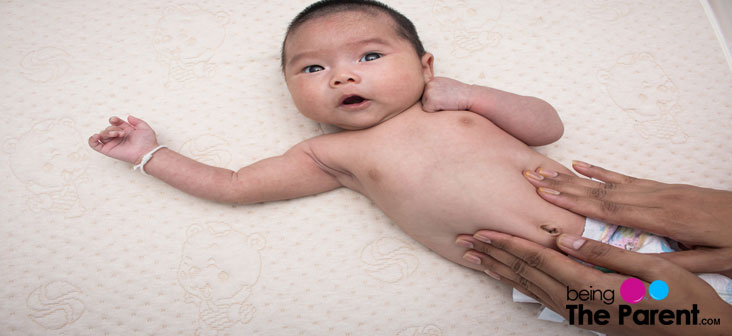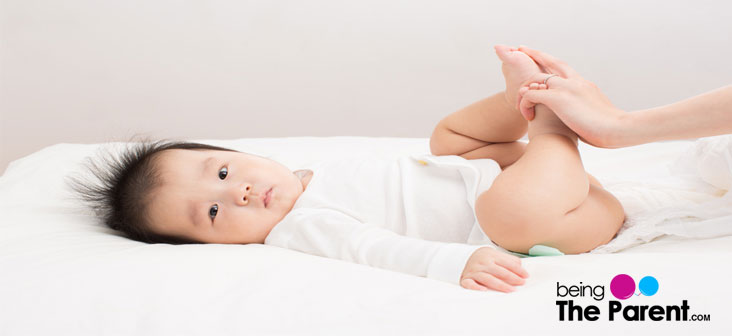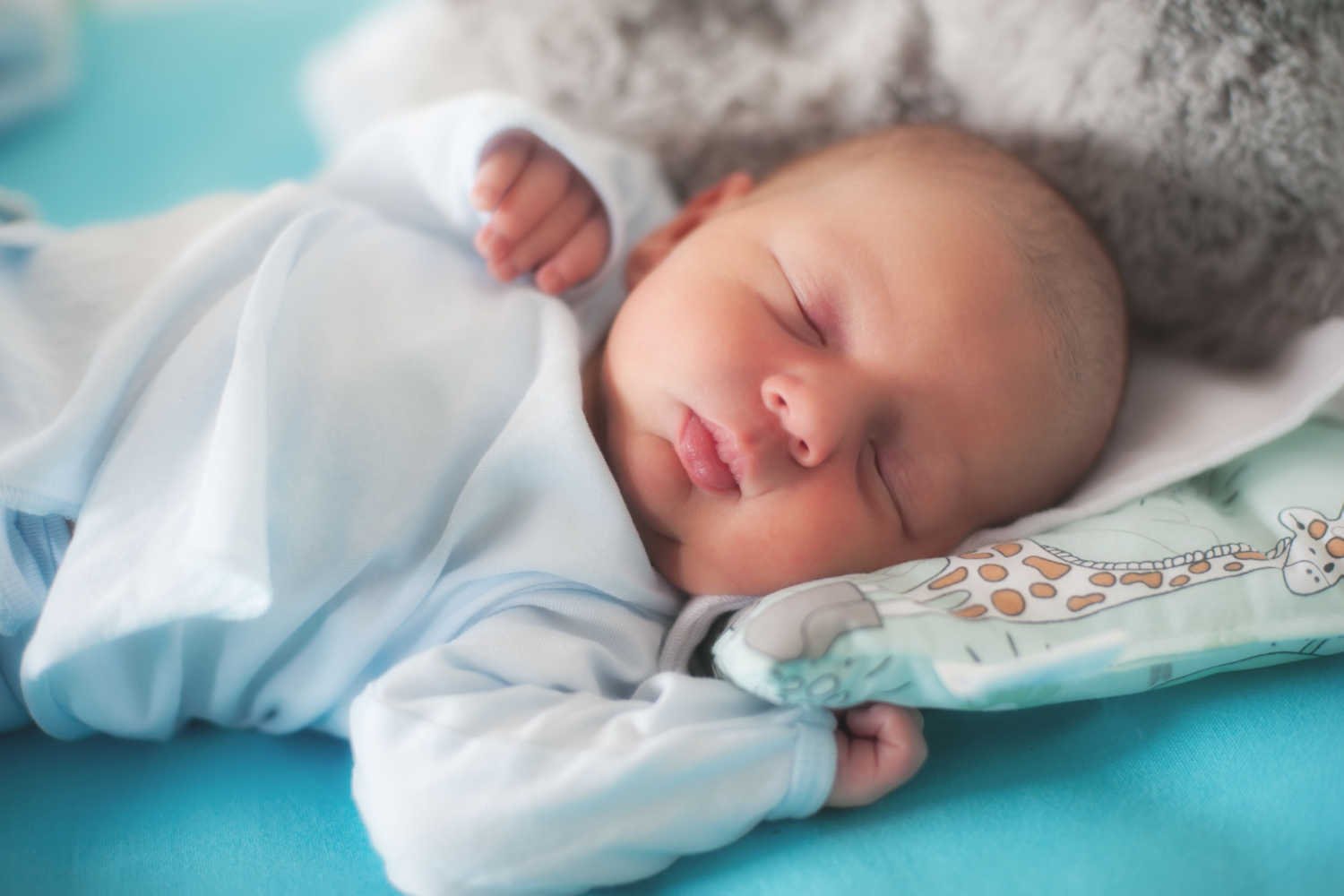
Pinworms In Toddlers
5 min readWritten by Editorial Team

Pinworms, also called as threadworms, or seatworms are very common intestinal parasites and affects millions of people every year specially toddlers and babies. As a parent, you may be concerned if you find out that your baby is infected with pinworms. But there is nothing to worry, as they are not difficult to get rid of. Continue reading to know more about this common worm infection and ways to treat it.

- What Are Pinworms?
- What Causes Pinworms In Babies?
- What Are The Symptoms Of Pinworms?
- How Can I Tell If My Baby Has Pinworms?
- What Are The Treatments For Pinworms In Babies?
- How To Prevent Pinworms In Babies?
What Are Pinworms?
Pinworms are tiny (between 2mm and 13mm long), white worms (scientifically called Enterobius vermicularis) that swarm the intestines of children and adults. It looks like bits of fine white cotton thread or like bits of a dental floss. They live on the contents of the gut and come out through the anus to lay their eggs. Therefore, if the baby has pinworm, you will be able to see the little worms in the area around the anus more often at night or in the early morning. Although preschoolers and older children are most affected, babies can catch them as well. Pinworms are infectious and can spread from one child to another very fast.
What Causes Pinworms In Babies?
Babies who haven’t started crawling and solely depend on breast milk are not at a risk of pinworm infection. However, these babies can get a pinworm infestation if his or her school-going sibling has a pinworm infection. The eggs of the pinworm can survive up to two weeks. When the eggs are laid in the anal region, it causes itching and irritation. The chances are high as the kids will not wash their hands properly after scratching and handle the toys, towels, and other objects of the baby. The eggs easily get attached to the surfaces and remain there and when the baby uses the contaminated stuff and puts his finger in the mouth or crawl on the infected surfaces the eggs easily get into his body. Once it reaches the intestine the eggs hatch into pinworms.
Another way through which the babies get pinworms is breathing in the eggs. This happens when the pinworm eggs, which is attached to the clothes, bed sheets, towel or blankets are released into the air while shaking it. If the baby inhales it, the pinworms will get into your baby’s body. These ingested eggs will then travel down the large intestine, and will hatch there. The female pinworms will crawl from the intestine to the anal region for laying eggs. When these worms move, they cause a lot of itching to your baby which can disturb his sleep.
When your baby’s anal region itches a lot, there is a possibility that your baby will scratch the area and as a result the eggs can enter his fingernails. This leads to start of another cycle when the baby puts the same finger in his mouth.
What Are The Symptoms Of Pinworms?
- If the child is big enough to talk, he will complain itching around the anus, especially during the night. However, babies are not able to talk. Disturbed sleep and fussiness without any reason can be an indication of pinworm infection
- Irritation around the anus, and around the vagina in baby girls are also signs of pinworm infection
- In girls, the infection can spread to the vagina causing a vaginal discharge. Severe itching can also irritate the skin and this can even lead to bacterial infection
- Babies may refuse to eat sometime as the pinworm in their gut can cause pain and discomfort
- Nausea and vomiting although very rare can also be a symptom of pinworm infection. This will happen only when there are too many pinworms in baby’s gut
How Can I Tell If My Baby Has Pinworms?
- If you doubt your baby has pinworms, press transparent tape to the anus of your baby. The eggs which are otherwise hard to see will stick to the tape
- Examining your child’s bottom or diaper at night or first thing in the morning by using a flashlight also helps to see the eggs
- Examining your baby’s poo carefully will also help as you can sometimes see the tiny pinworms wriggling
- If your baby has an itchy bottom but you do not find pinworms or eggs, it could be a signal of other problems like dryness from vigorous cleaning, a diaper rash or even some kind of bacterial infection

What Are The Treatments For Pinworms In Babies?
Mebendazole, Albendazole, and pyrantel are some of the most commonly used over counter medicines to treat the pinworm in babies. Sometime depending on the severity of the baby’s pinworm infection the doctor may suggest treatment to the whole family as pinworms are contagious and spread quickly.
The doctor will suggest repeat treatment after a gap of two weeks in order to make sure the worms are totally out of your baby’s system. This is because the symptoms of pinworm infection will go away within one week of treatment but since the eggs can remain intact for two weeks, the repeat treatment will ensure that all the pinworms that may have hatched from eggs after the first treatment are killed. Once your baby gets both the treatment, you may notice many worms wriggling and moving in your baby’s stool. This is an indication that the worms are leaving your baby’s body and there is nothing to worry about it.
How To Prevent Pinworms In Babies?
You can take following steps to not only treat pinworms at home but also to prevent them for infecting your baby.
- Keep your baby’s fingernail clipped short
- Stop your baby from sucking the thumb
- Wash the clothes, bed sheets, towels daily with warm water
- Wash your baby’s hands frequently
- Sponge bath or normal bath is a must in the morning to remove the pinworm eggs effectively
- If the toys are washable, wash it with hot water and soap
- Make sure the room gets plenty of sunlight. Sunlight helps to kill the pinworm eggs
- Ensure that you clean the toilet seats every day in order to minimize the risk of infection
- Stop your baby from scratching his itchy anal region by making him wear a diaper all the time
- If your older kid or anyone in the house is being treated for pinworms, wash everyone’s clothing and bedding in hot water to kill any worms of their eggs
Has your baby ever been infested with pinworms? How did you treat it? What measures did you take to prevent it? Mommies, please share your experience in the comments section below.Read here to know about Tapeworms in babies.

Editorial Team,
With a rich experience in pregnancy and parenting, our team of experts create insightful, well-curated, and easy-to-read content for our to-be-parents and parents at all stages of parenting.Read more.
Responses (0)
Want curated content sharply tailored for your exact stage of parenting?
Related articles

Hibiscus For Babies – A Nutrient-Rich and Safe Addition To Their Diet

Bedtime Fading Method of Sleep Training Your Baby – Know All About it

Top 6 Best Counting Books For Babies in First Year

Breastfeeding After IVF – Tips to Cope

Cytomegalovirus (CMV) in Babies – What is it, Causes, and Treatments

Tickling Babies – When Can You Start and When to Avoid
Sponsored content
Discover great local businesses around you for your kids.
Get regular updates, great recommendations and other right stuff at the right time.





